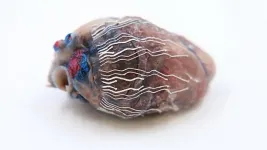(Press-News.org) June 17, 2021, Nutley, NJ - During two months at the height of the first wave of COVID-19, Hackensack Meridian Health experts helped find the best way to triage and prioritize necessary surgeries across the health network. Their work allowed the system to keep up with crucial care - and it may help point the way forward in case of future emergencies.
The health network experts implemented the medically necessary time sensitive (MeNTS) surgical scoring system developed by the University of Chicago to triage the case load across the health system, the largest in New Jersey. The results are published now in The American Journal of Surgery, and the lead author is a medical student at the Hackensack Meridian School of Medicine.
"This is critical work and it shows how important teamwork is in pulling together at the time of greatest need," said Ihor Sawczuk, M.D., FACS, the network's chief research officer and president of its northern region. "We are proud to do our part in showing how we can best save lives, even during a historic pandemic."
"Our team kept our priorities straight, and our mission clear," said Michael Stifelman, M.D., professor and chair of Urology, at the Hackensack Meridian School of Medicine, as well as the department chair of Urology at Hackensack University Medical Center. "It was a great job by all - and we leveraged the skills of our SOM students to work with us in designing and evaluating our 'best practices.'"
All elective surgeries for adults were canceled by an executive order from the New Jersey governor in March 2020, at the height of the COVID-19 pandemic. It was lifted in May 2020.
Over the course of those two months, the health network the department chairs and a peri-operative committee reviewed which cases needed immediate attention, at first relying on a system called the Elective Surgery Acuity Scale (ESAS). But the drawbacks of ESAS - including what the definition of "non-elective" was, and the management of what fast became an overwhelming number of requests - pushed them to find another way. Instead they implemented MeNTS.
Over the two-month time frame, there were 1,316 requests for surgical intervention. The MeNTS system classified 645 as requiring procedures within two weeks: 50 percent were same-day surgeries, 43 percent inpatient procedures, and the remainder outpatient visits.
They compared the results from the same time period in 2019, based on key metrics like mortality, 30-day readmissions, and length of stay.
The determination was that the MeNTS system kept the surgical procedures outcomes and management virtually the same as the non-pandemic times, with just slightly longer length of stay in outpatient cases, and more blood transfusions in inpatient cases.
Some 216 of the 645 prioritized cases were ultimately not performed in the two-month window. Follow-up determined the leading reason was patients' fear of the spread of COVID-19.
"The real game changer with implementing our system is that it also evaluated resource utilization and time sensitivity in making decisions. This is not possible with ESAS," added Stifelman. "Also it leveraged our research team and RedCap database software allowing us to process and manage large amounts of info and requests quickly."
The lead author of the paper is Jay Zaifman, a student of the 2019 cohort. Other authors include: Gregory S. Sugalski, M.D.; Lisa K. Tank, M.D.; Massimo M. Napolitano, M.D., FACS; Donald A. McCain, M.D., FACS, Ph.D.; Mark D. Schlesinger, M.D.; Joseph P. Underwood, M.D.; Terri D. Freguletti, MAS; Lucy Pereira-Argenziano; Robyn J. Kretzschmar, MAS; and Stifelman.
"This is incredible work, and we are glad our students can get such a great head start on their careers even as they work toward their degree," said Bonita Stanton, M.D., founding dean of the Hackensack Meridian School of Medicine.
INFORMATION:
Over the past three decades, fundamental groundwork for building quantum computers has been pioneered at the University of Innsbruck, Austria. As part of the EU Flagship Quantum Technologies, researchers at the Department of Experimental Physics in Innsbruck have now built a demonstrator for a compact ion trap quantum computer. "Our quantum computing experiments usually fill 30- to 50-square-meter laboratories," says Thomas Monz of the University of Innsbruck. "We were now looking to fit the technologies developed here in Innsbruck into the smallest possible space while meeting standards commonly used in industry." The new device aims to show that quantum computers will soon be ready for use in data centers. "We were able to show that ...
The glaciers of Nanga Parbat - one of the highest mountains in the world - have been shrinking slightly but continually since the 1930s. This loss in surface area is evidenced by a long-term study conducted by researchers from the South Asia Institute of Heidelberg University. The geographers combined historical photographs, surveys, and topographical maps with current data, which allowed them to show glacial changes for this massif in the north-western Himalaya as far back as the mid-1800s.
Detailed long-term glacier studies that extend the observation period to the time before the ubiquitous ...
How much do traditional practices contribute to the protection of local biodiversity? Why and how are sacred groves locally valued and protected, and how can this be promoted and harnessed for environmental protection? Working together with the University of Kurdistan, researchers of the University of Göttingen and the University of Kassel have examined the backgrounds of this form of local environmental protection in Baneh County, Iran.
"Around the world, local communities are voluntarily protecting certain parts of their surroundings due to religious ...
Researchers at the University of Texas Medical Branch have observed that SARS-CoV-2, the virus that causes COVID-19, can infect the testes of infected hamsters. The findings, published in the journal Microorganisms, could help explain symptoms some men with COVID-19 have reported and have important implications for men's health.
As the pandemic goes on, clinicians continue to report their findings that COVID-19 affects more than just the lungs. Some patients have reported testicular pain and some reports have shown decreases in testosterone, a key hormone produced in the ...
Below please find a summary for a new article that will be published today in Annals of Internal Medicine. The summary is not intended to substitute for the full article as a source of information. This information is under strict embargo and by taking it into possession, media representatives are committing to the terms of the embargo not only on their own behalf, but also on behalf of the organization they represent.
FDA advisory panelist outlines numerous issues with aducanumab's accelerated approval for Alzheimer's disease
Abstract: https://www.acpjournals.org/doi/10.7326/M21-2603
URL ...
WEST LAFAYETTE, Ind. – Surgeons may soon be able to localize critical regions in tissues and organs during a surgical operation thanks to a new, patent-pending Purdue University biosensor that can be printed in 3D using an automated printing system.
Chi Hwan Lee created the biosensor, which allows for simultaneous recording and imaging of tissues and organs during a surgical operation. Lee is the Leslie A. Geddes Assistant Professor of Biomedical Engineering in the Weldon School of Biomedical Engineering and assistant professor of mechanical engineering. Lee also has a courtesy appointment in materials engineering.
"Simultaneous recording and imaging could be useful during heart surgery in localizing critical regions and guiding ...
In the realm of social media, anti-science views about COVID-19 align so closely with political ideology -- especially among conservatives -- that its predictability offers a strategy to help protect public health, a new USC study shows.
Resistance to science, including the efficacy of masks and vaccines, poses a challenge to conquering the coronavirus crisis. The goal of achieving herd immunity won't happen until society achieves consensus about science-based solutions.
The USC study's machine-learning assisted analysis of social media communications offers policymakers and public health officials new tools to anticipate shifts in attitudes ...
A rare parasitic infection imported from Europe continues to take root in Alberta, Canada. The province is now the North American hotspot for human alveolar echinococcosis (AE), which takes the form of a growth in the liver, causing serious and potentially deadly health complications.
A END ...
Only 2% of vehicles are electrified to date, but that is projected to reach 30% in 2030. A key toward improving the commercialization of electric vehicles (EVs) is to heighten their gravimetric energy density - measured in watt hours per kilogram - using safer, easily recyclable materials that are abundant. Lithium-metal in anodes are considered the "holy grail" for improving energy density in EV batteries compared to incumbent options like graphite at 240 Wh/kg in the race to reach more competitive energy density at 500 Wh/kg.
Yan Yao, Cullen Professor of electrical ...
MIAMI--In a new analysis on managed retreat--the climate adaptation response of moving people and property out of harm's way--researchers explore what it would take for managed retreat to be supportive of people and their priorities. A key starting point is considering retreat alongside other responses like coastal armoring and not just as an option of last resort.
In a new paper in the journal Science, University of Miami (UM) Rosenstiel School of Marine and Atmospheric Science researcher Katharine Mach argues that managed retreat should be viewed as a proactive option that can support communities and livelihoods in the face of climate change.
"Managed retreat ...





